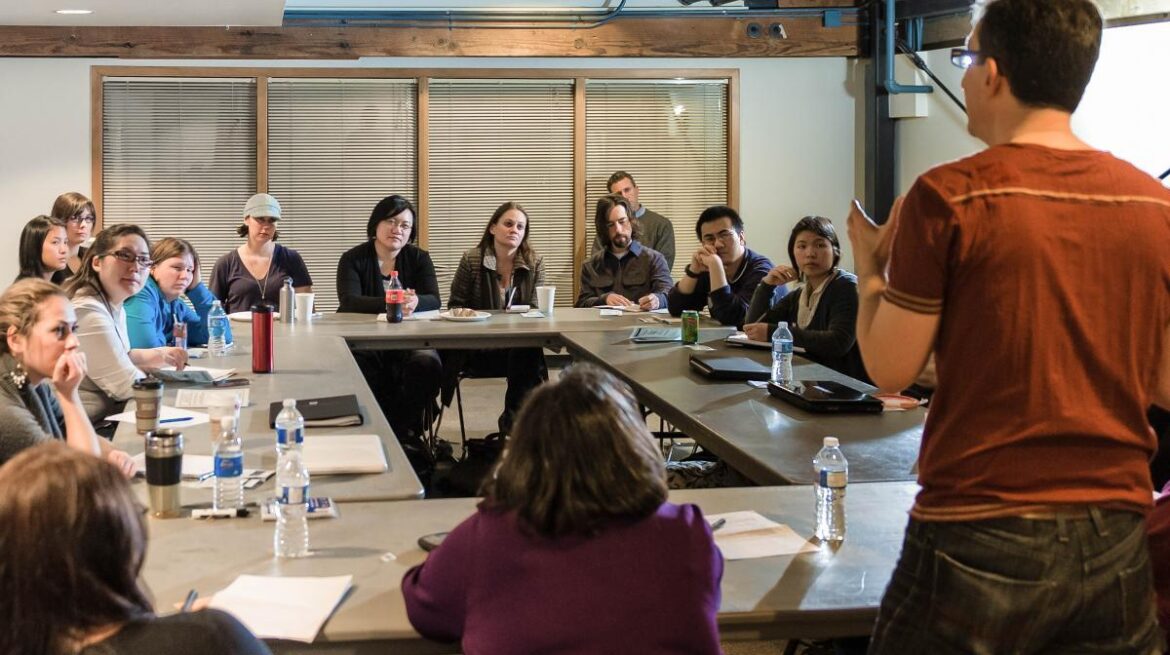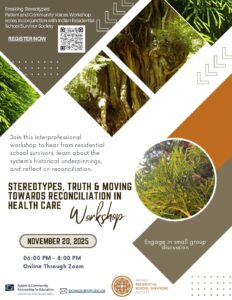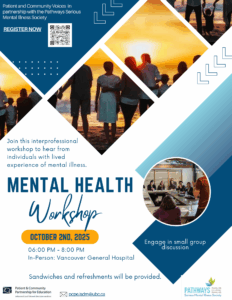
Patient & Community Voices Workshops and Events
The Patient and Community Voices (PCV) workshop series consists of inter-professional workshops in which students learn directly from patients and community members through their stories and expertise. Workshops are developed, evaluated and refined by students, patients / community members, and UBC faculty working together in a participatory educational design.
The workshop series includes:
- Unmet Health Care Needs: The Impact of Poorly Understood Complex Chronic Conditions
- Mental Health: Empathy & Compassion
- Substance Use Care: Addressing Stigma in the Health System to Improve Patient Outcomes
- The Lived Experience of Drug Use
- Allies in Health: Connecting with Communities
- Stereotypes, Truth & Moving towards Reconciliation in Health Care
- Positive Reflections and Voices Unheard: Learning from persons living with HIV
- A Space to Thrive: Enhancing Access to Healthcare for Teenage Girls who Live in Poverty
- The Lived Experience of Spinal Cord Injury
- The Caregiver’s Journey: Heartbreak and love
- Talk is Cheap: Living and communicating with aphasia
- Learning to Provide Better for Deaf & Hard of Hearing
- Mental Wellness: A Way of Life
- Trans Health 101
New workshops continue to be developed.
RegisterWorkshops
Some disabilities are invisible. In this workshop students from different health programs will learn about three diseases that are poorly understood – Myalgic Encephalomyelitis (ME), Fibromyalgia (FM), and Lyme disease. People affected by these conditions often experience financial hardship, loss of identity, and have difficulty being believed by medical professionals and society. You will hear how these conditions and the difficulties in accessing effective and timely treatments can impact the daily living and quality of life of people living with or caring for a loved one with one or more of these complex chronic conditions. Approaches and resources that best support people living with ME/FM/Lyme disease in their journey will be presented.
Partners: ME Victoria Association, MEFM Society of BC, MEFM Action Network, BC Lyme Society.
Join us for an in-person seminar learning about refugee health and the ways in which healthcare providers can facilitate culturally safe and competent care. We will be joined by a Ukrainian refugee who will share their experiences fleeing from war in 2021. Our community partner is the Refugee Health Initiative, a group that helps refugee families transition to Canada. The session will be facilitated by Dr. Maureen Mayhiew, who recently published a memoir about serving as a physician in Afghanistan between 2000 – 2010 as part of Médecins Sans Frontières.
Partner: Refugee Health Initiative
Venue: Gordon and Leslie Diamond Health Care Centre (Additional location details provided after registration.)
Improving health care experiences for young women and ways to reduce barriers individually and collectively are discussed in the context of intersecting forms of oppression (gender, age, colonialism, racism).
Partner: Justice for Girls
People who use substances and their families face stigma and discrimination across the system of care, impacting their ability to access life-saving harm reduction services, seek treatment, and pursue recovery. This workshop connects interprofessional UBC students and people with lived experiences of substance use to better understand how health care providers can address stigma in their own practices.
Partner: BC Centre on Substance Use (BCCSU)
This interprofessional workshop will look at the benefits available for people living with disabilities in BC, and share how healthcare practitioners can better assist clients. Through presenting patient stories and client interactions, it will cover common barriers for people living with disabilities and how we can make a difference with systemic advocacy.
Partners: Disability Alliance BC
Students are introduced to the successes and challenges of being a family caregiver for a loved one with a chronic health condition.
Partners: UBC Health Mentors Program
In this workshop students will have the opportunity to hear from a residential school survivor, as well as in intergenerational survivor; break down and discuss professional and personal stereotypes; learn about the historical underpinnings of the Indian Residential School system; and recognize the impacts of this system in Canada. There will also be the opportunity to reflect and dialogue on the role of health care providers in reconciliation.
Partner: Indian Residential School Survivor Society
The role of empathy and compassion in recovery from serious mental illness and the importance of practicing empathetic guidelines when working with people living with a mental illness are presented.
Partner: Pathways Serious Mental Illness Society
The challenges of living with HIV are shared through personal stories and reflections of people living with HIV. Support and advocacy available in Vancouver-based community organizations serving persons living with HIV are also presented.
Partner: Persons Living with HIV
(This workshop was developed in partnership with Positive Living BC.)
This workshop is an opportunity for students from different health programs to connect with community health organizations and people who use their services. In this workshop students will be introduced to four local organizations, what they do and how health professionals can work with community organizations to better support patients and families with complex health problems.
Partners: Family Support Institute, Scleroderma Association, Community Living Society, BC Hep Network
This community based workshop connects UBC students with speakers who have lived experience of drug use, poverty, and overdose prevention in the DTES. Through storytelling and conversation students learn about the experiences and needs of people who use drugs and how to respond to addiction and overdose with skill and compassion.
Partner: Megaphone Speakers Bureau
Personal narratives and case studies are shared to illustrate the range of ways in which spinal cord injury can affect individuals, including the physical, emotional, psychosocial and financial barriers. Students will learn about the unique experiences of people living with spinal cord injury and what they can do as health professionals to provide support.
Partner: Spinal Cord Injury BC
Students will experience a simulation of what it is like to have difficulty hearing. Deaf and hard of hearing culture, technologies available and communication strategies are shared.
Partner: Western Institute for the Deaf and Hard of Hearing
The need for gender affirming care, community resources and strategies to provide positive healthcare experiences for transgender individuals are shared.
Partners: UBC Health Mentors and Trans Care BC
Challenges and difficulties of living with mental illness and navigating the healthcare system are shared through personal stories and reflections.
Partner: Richmond Mental Health Consumer & Friends Society
Through video training and small discussion groups, students will learn about aphasia and discovered valuable ways to support clients in their healthcare practice.
Partner: UBC School of Audiology and Speech Sciences (SASS) Aphasia Mentoring Program


